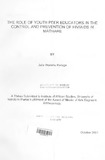| dc.description.abstract | This study was designed to investigate the role played by the youth peer educators in the control and prevention of HIV/AIDS. The fieldwork study was conducted between November 1998 and February 1999. To elicit the data, the study utilized library research, interviews, and focus group discussions. A total of 130 respondents were interviewed and five focus group discussions held. The data obtained was analyzed using qualitative and quantitative methods.
The study was based on the following assumptions: Youth peer educators provide youth with information on reproductive health issues; Member's perception of the information determined their adoption; Youth peer educators encounter constraints which hinder the effectiveness of peer education and youth peer education has had an influenced on youth's sexual behavior.
The study revealed that the youth peer educators provided information on drugs, adolescence, STD's and HIV/AIDS. However, information on drugs and AIDS was ranked as most important by a vast majority of the respondents. The information was perceived to be useful, relevant and practical to youth.
The research also revealed that the youth in Mathare start engaging in sex at a very early age. Although abstinence was rated as an effective prevention measure to counter HIV/AIDS infection the following were cited as major obstacles towards abstinence among the youth: influences of pornographic videos popularly known as "ponos", intake of alcohol and drugs and influence of friends.
Youth peer educators encountered several constraints in the course of their work. This includes among others, ignorance from peer, lack of time and lack of motivation.
On the basis on the findings, the study recommends that the youth peer educators devise a new approach to their education to make it more interesting and appealing to the peers. On the same line educators should continue educating their peers for there is misconception on methods of transmission and prevention of HIV/AIDS. Furthermore, more information is needed on STDs for only a small proportion of respondents had received the same considering STDs are very prevalent among the young people. | en |

